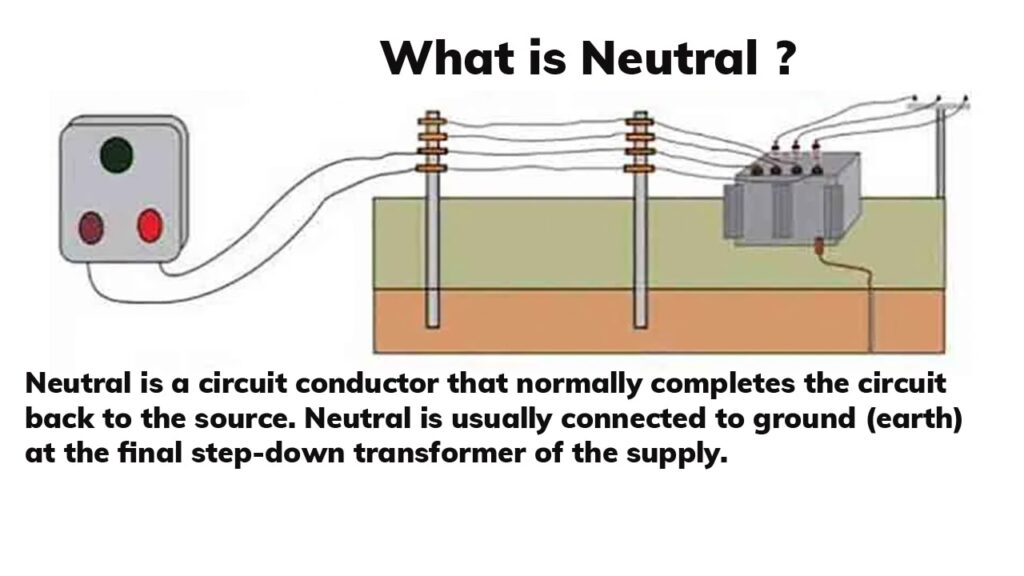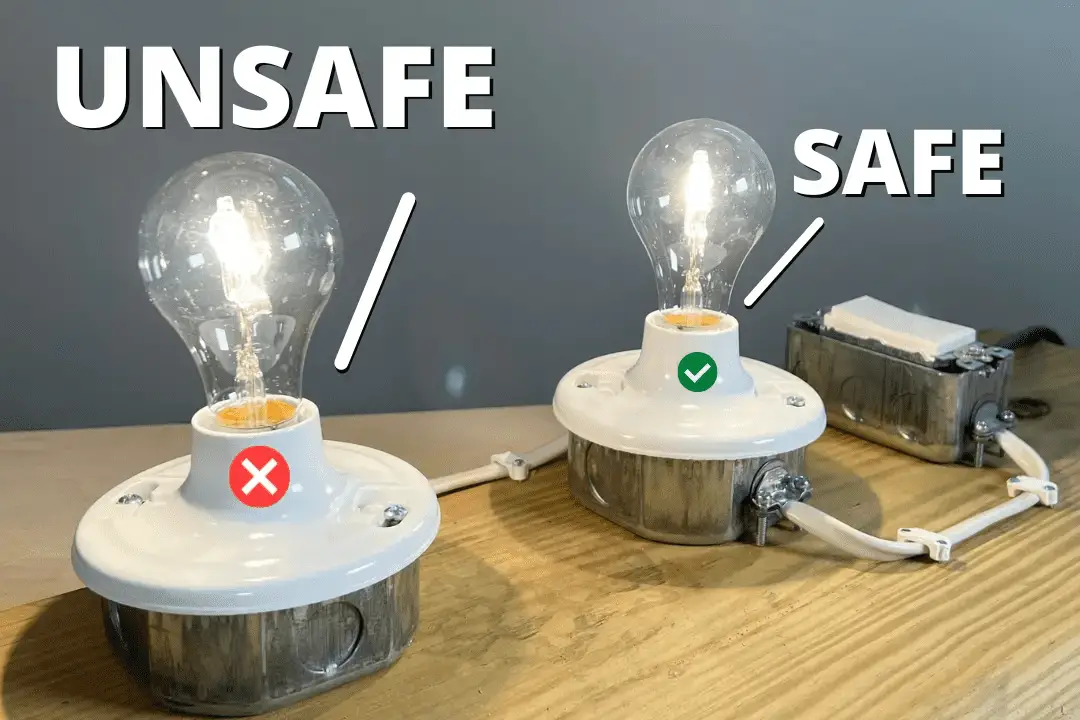Outstanding Tips About What Happens If Neutral Wire Is Broken

The Silent Danger
1. Understanding the Neutral Wire's Role
Okay, let's talk about something that sounds boring but is actually pretty important: the neutral wire. Think of your home's electrical system like a highway. The hot wire carries the electricity TO your appliances, and the neutral wire is supposed to carry it safely BACK to the power source. It's the return lane, ensuring a balanced flow. Without it, things can get a little... dicey. The keyword here is "neutral wire", a noun, and understanding its failure is our main point.
In a perfectly functioning electrical circuit, the neutral wire maintains a voltage very close to zero. This is why it's often referred to as the "grounded" conductor (though it's not exactly the same as the grounding wire, which we'll touch on later). This near-zero voltage is crucial for the safe and efficient operation of your electrical devices. Imagine a seesaw perfectly balanced — that's what the neutral wire is trying to achieve.
Now, a break in this neutral wire disrupts this delicate balance. It's like someone threw a wrench into the seesaw. The return path for electricity is now compromised, and that's where the fun (read: danger) begins. Before we dive into the potential chaos, it's worth noting that neutral wire breaks are more common than you might think, especially in older homes with aging wiring or after storm damage.
Basically, when a neutral wire breaks, you're left with an electrical system that's trying to function with a vital part missing. Think of it like trying to drive a car with a flat tire it's not going to go well, and you're risking some serious damage. And that damage can extend beyond just your appliances; it can become a fire hazard.

Symptoms of a Broken Neutral Wire
2. Recognizing the Trouble
So, how do you know if your neutral wire has taken a vacation? Well, there are a few telltale signs that should raise a red flag faster than a rogue matador. One of the most common is fluctuating voltage. You might notice lights dimming and brightening seemingly at random, or appliances behaving erratically.
Another classic symptom is that some outlets or circuits might stop working altogether, while others are working fine. This is because the broken neutral wire is creating an imbalance in the system, causing voltage to flow unpredictably. It's like trying to share a single straw among multiple people; some get more than others, and some get nothing at all.
Pay close attention to any unusual burning smells coming from outlets or appliances. This is a serious warning sign that something is overheating, possibly due to the unstable voltage caused by the broken neutral wire. If you smell something burning, turn off the affected circuit breaker immediately and call an electrician.
Finally, be wary of any tingling sensations when touching metal parts of appliances or electrical fixtures. This could indicate that electricity is leaking where it shouldn't be, which is a serious safety hazard. Remember, electricity should only flow through the wires; it shouldn't be trying to give you a surprise handshake!

The Nasty Consequences
3. Potential Dangers and Damages
Now, let's get down to the nitty-gritty of what can actually happen when the neutral wire decides to call it quits. The most immediate concern is damage to your appliances. The unstable voltage caused by the broken neutral wire can fry sensitive electronics, leaving you with a pile of expensive, useless junk. Think TVs, computers, refrigerators the whole shebang.
But it doesn't stop there. The imbalance in voltage can also overload circuits, leading to overheating and potentially causing electrical fires. Remember that burning smell we talked about earlier? That's the precursor to a much bigger problem. An electrical fire can spread quickly and cause significant damage to your home, not to mention putting your family at risk.
Another serious consequence is the risk of electric shock. If the neutral wire is broken, the grounding system might not function correctly, which means that any exposed metal parts of appliances or fixtures could become energized. Touching these energized parts could result in a potentially fatal electric shock.
Essentially, a broken neutral wire creates a domino effect of potential problems. It starts with fluctuating voltage and appliance damage, but it can quickly escalate to electrical fires and electric shock hazards. It's not something to be taken lightly. Ignoring the warning signs is like playing Russian roulette with your electrical system.

Danger! Reversed Hot And Neutral Wires In Lights Outlets Everyday
Prevention and Protection
4. Safeguarding Your Electrical System
Alright, so how do we prevent this electrical nightmare from happening in the first place? The key is proactive maintenance and a healthy dose of awareness. First, get your electrical system inspected regularly by a qualified electrician, especially if you live in an older home. They can identify potential problems before they become major headaches.
Another important step is to use surge protectors on all your sensitive electronics. Surge protectors can help protect your devices from voltage spikes caused by a broken neutral wire or other electrical disturbances. Think of them as little bodyguards for your gadgets.
Make sure your home's electrical system is properly grounded. Grounding provides a safe path for electricity to flow in the event of a fault, which can help prevent electric shock and reduce the risk of fire. This is where that grounding wire we mentioned earlier comes into play.
Finally, be mindful of overloading circuits. Plugging too many appliances into a single circuit can strain the wiring and increase the risk of a neutral wire breaking. If you're constantly tripping breakers, it's a sign that you need to redistribute your electrical load or add more circuits. Remember, it's better to be safe than sorry when it comes to electricity.

How To Remove A Broken Electrical Box At Jeff Chavis Blog
What to Do If You Suspect a Broken Neutral Wire
5. Calling in the Professionals
Okay, so you suspect your neutral wire might be having a meltdown. What do you do? The most important thing is DON'T try to fix it yourself. Electricity is not something to mess around with unless you're a qualified electrician. Seriously, leave it to the pros.
The first thing you should do is turn off the main circuit breaker to your home. This will cut off the power supply and reduce the risk of electric shock. Then, call a licensed electrician immediately. Explain the symptoms you've been experiencing and let them diagnose the problem.
While you're waiting for the electrician to arrive, avoid touching any metal parts of appliances or electrical fixtures. As we mentioned earlier, these could be energized if the neutral wire is broken. It's better to err on the side of caution.
Finally, resist the urge to Google "DIY electrical repair" and start tinkering with wires. Trust us, it's not worth the risk. A qualified electrician has the knowledge, experience, and tools to safely diagnose and repair a broken neutral wire. In this case, playing the hero could end up being a shockingly bad idea.

FAQ About Broken Neutral Wires
6. Your Questions Answered
Q: Can a broken neutral wire cause a fire?A: Absolutely! A broken neutral wire can lead to overloaded circuits and overheating, which can definitely spark an electrical fire. It's a serious hazard, so don't ignore the warning signs!
Q: Is a broken neutral wire the same as a bad ground?A: Not exactly, but they're related. A broken neutral wire disrupts the return path for electricity, while a bad ground compromises the safety path for electricity in case of a fault. Both are bad news for your electrical system.
Q: How much does it cost to fix a broken neutral wire?A: The cost can vary depending on the complexity of the repair and your location. It's best to get a quote from a licensed electrician. But remember, fixing it is cheaper than dealing with the aftermath of a fire!
Q: Can I still use my appliances if I suspect a broken neutral wire?A: It's best to avoid using any appliances until the problem is resolved. The fluctuating voltage can damage them, and you're also risking an electric shock.